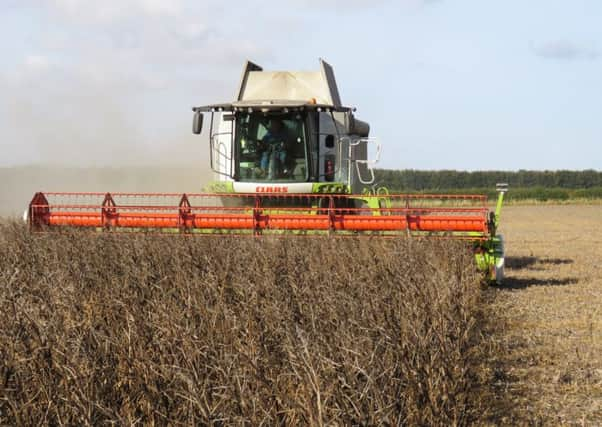Leaner farm businesses have boosted sector’s economic worth


Lloyds Bank said borrowing by the farming industry has quadrupled over the past five years, but despite depressed farm gate prices, the result has been investment in infrastructure, expansion and automation.
While times remain tough for farming, recent challenging market conditions have actually boosted productivity, Lloyds’ head of agriculture Andrew Naylor said, meaning the industry is now punching above its weight again relative to the rest of the UK economy.
Advertisement
Hide AdAdvertisement
Hide AdTight purse strings have driven efficiencies, meaning the industry is a leaner beast, Mr Naylor said. “We’ve seen improving efficiency over the past 12 months, and now productivity, which is one of the greatest challenges to the UK economy as a whole, is actually much better in the agriculture sector than in other industries.”
Agriculture’s contribution to the UK’s national income - or Gross Value Added - is now 10.3 per cent.
Mr Naylor said: “One of the key factors has been this extended period of low interest rates, which has definitely fostered investment; much of agriculture’s borrowing in recent years has been channelled into infrastructure, expansion and automation – placing us in a strong position for the future despite depressed markets.”
The Bank of England’s figures for net lending to agriculture, forestry and fisheries increased from £292million to £1,260m between 2010-2014, but at the same time UK farmers’ contribution to the economy grew by 45 per cent.
Advertisement
Hide AdAdvertisement
Hide AdMr Naylor said: “Borrowing in the farming industry may have quadrupled over the past five years, but the resulting investments have helped grow UK farming’s contribution to the economy to almost £10 billion annually.”
Improved productivity will stand the sector in good stead going into 2016, he said.
“We are expecting that falls in commodity prices will at least stabilise in the year ahead, and with anticipated growth in the overall economy of around 2.5 per cent next year, growth in agriculture is expected to remain positive.
“The good news is farming remains of huge importance to the economy as a whole. Total farm output has grown by a quarter to £25.8billion in the past five years.”
Advertisement
Hide AdAdvertisement
Hide AdWhile a positive perspective will be a relief for some farmers, there remains enormous challenges in the short-term, and confidence in many sectors is shot.
A strong harvest has forced the price of wheat down while an oversupply of milk globally has seen farm gate prices tumble - up to three Yorkshire dairy farmers have quit the industry every single month over the last year.
Lamb prices are at a four-year low and the price of beef is down despite anticipated stability because of seasonal demand in the run up to Christmas.
Confidence is low, said Madge Moore, chairman of the Yorkshire Food, Farming and Rural Network.
Advertisement
Hide AdAdvertisement
Hide AdWriting in Country Week on Saturday, she said: “With price volatility, falling farm gate prices, uncertainty around the impending EU referendum and a food scare concerning health risks associated with processed meat, one can see why confidence in the industry is low.”